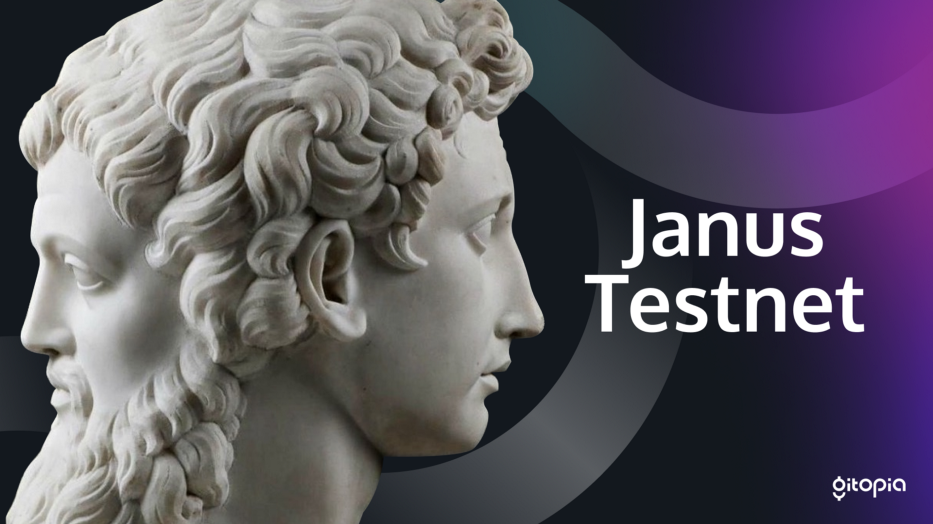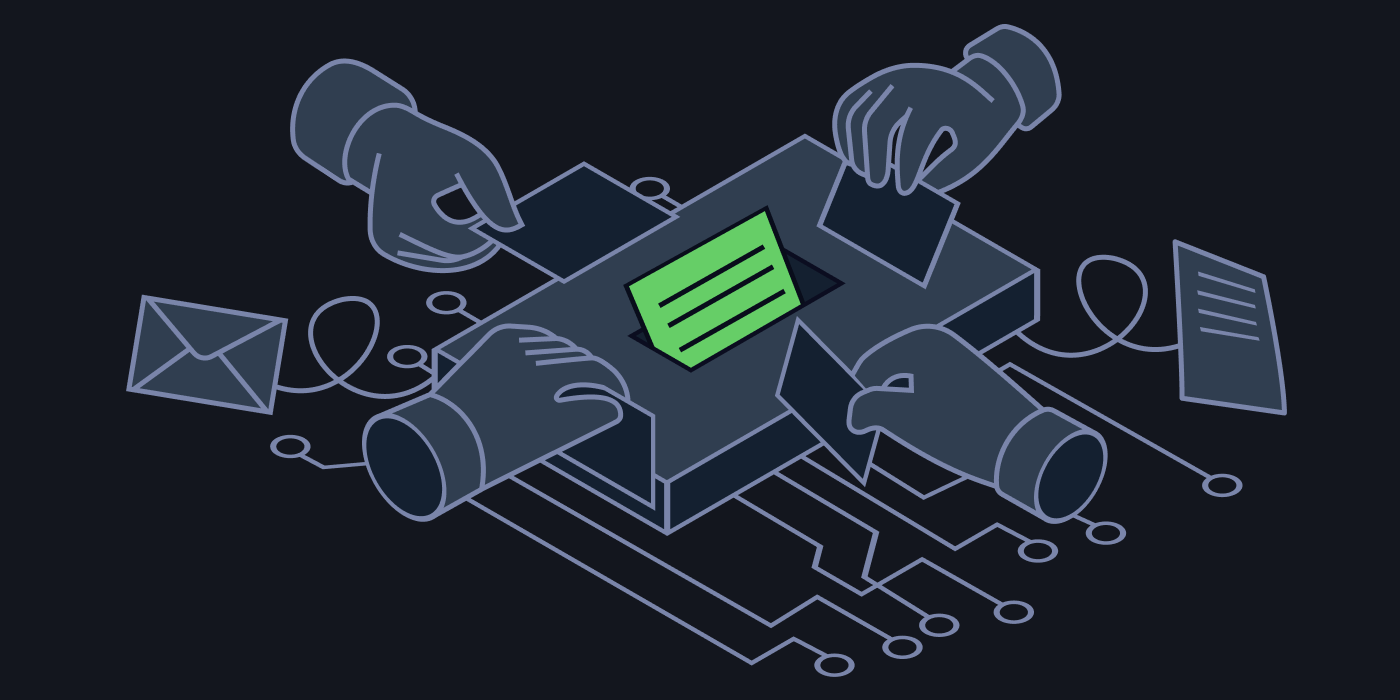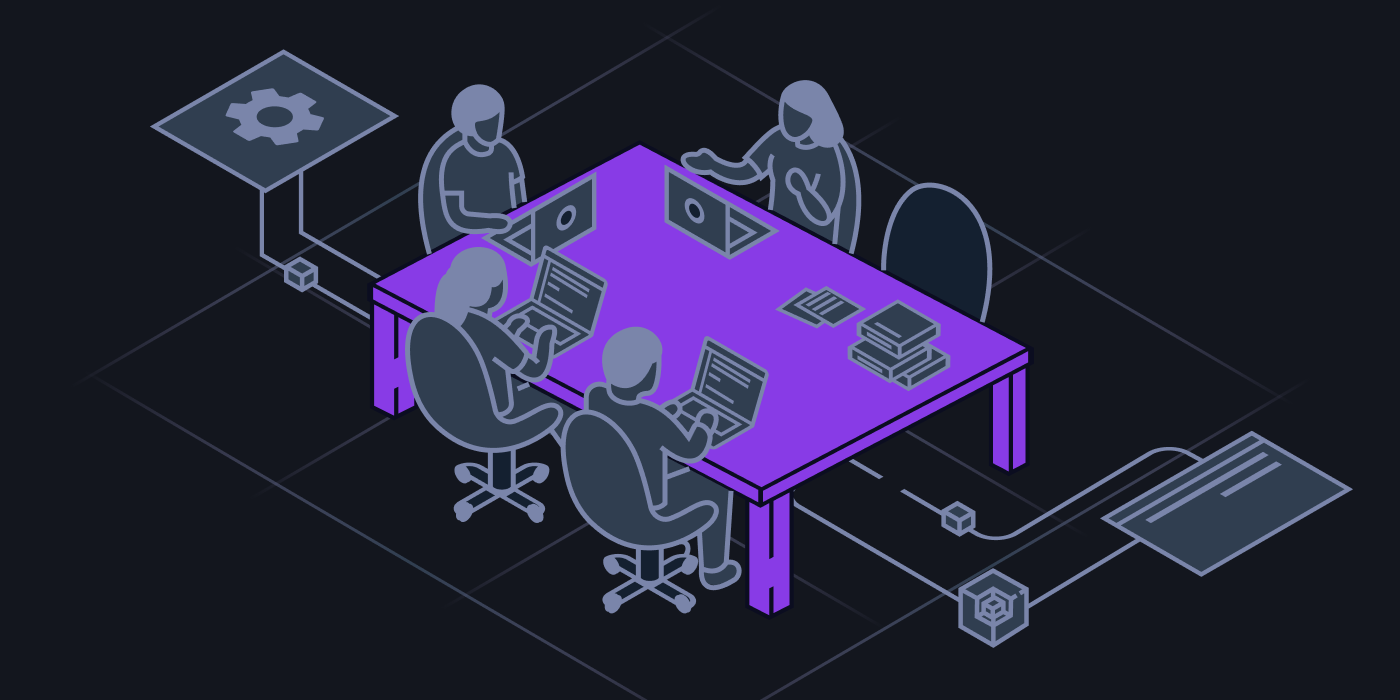Last September, we launched the first iteration of Gitopia’s Testnet, giving users a sneak peek into Gitopia — a decentralized code collaboration platform for Web3. The response has been overwhelmingly positive, and we’d like to thank everyone for their feedback!
Thank you for helping us test and refine Gitopia during this phase! Having your input has been very important to us, and we hope to bring you the platform you deserve in the future.
Today, we are excited to introduce the next milestone in Gitopia’s roadmap: Gitopia Janus Testnet. The Gitopia Janus Testnet will include a variety of features that will make hosting projects on Gitopia and collaborating on them with developers worldwide a lot easier.
The highlighting features getting released in the Janus Testnet are:
Collaboration workflows - fork, pull request, merges, issue and diff
Releases — A workflow for shipping software to the end-user
DAO at Gitopia — A one-click solution to create actionable value-driven DAOs for your opensource and #web3 projects
Ledger Hardware Wallet and Keplr Wallet Extension support
Shortly after Janus testnet launch, we will be announcing details of an incentivization mechanism that has been designed to bootstrap the Gitopia Ecosystem and onboard early stakeholders such as validators, developers, and ecosystem partners to the platform. A significant portion of the genesis supply of Gitopia’s native token, $LORE, will be distributed to the community via this incentivization mechanism.
We have many more features, programs, rewards, and incentives planned for the coming weeks and months, so stay tuned to our community channels to get intimated.
What is Gitopia?
Gitopia is the next-generation Decentralized Code Collaboration Platform fueled by a decentralized network and interactive token economy. It is designed to optimize the software development process through collaboration, transparency, and open source incentivization.
Gitopia provides developers with a community-governed decentralized platform where they can host their git repositories permanently and collaborate with others on code without worrying about getting censored or losing access to their code. Gitopia also leverages open source incentivization to reward open-source contributions and help maintainers sustain their open-source projects.
Gitopia Janus Testnet
The Gitopia Janus Testnet heralds a new stage in Gitopia’s evolution, featuring collaboration features that enable users to share and collaborate on code. We named the testnet after Janus — the Roman god of beginnings, transitions, and endings — because we hope it will encourage projects to move to Decentralized collaboration platforms, kickstarting the end of domination by Centralized code collaboration platforms and beginning of a Decentralized era.
With the Janus Testnet, we’re introducing many new features that will make it easier for teams and organizations(DAO) to host their projects on Gitopia and efficiently collaborate on them with developers worldwide.
Let’s take a closer look at the highlighting features of the Gitopia Janus Testnet.
Collaborative Workflows
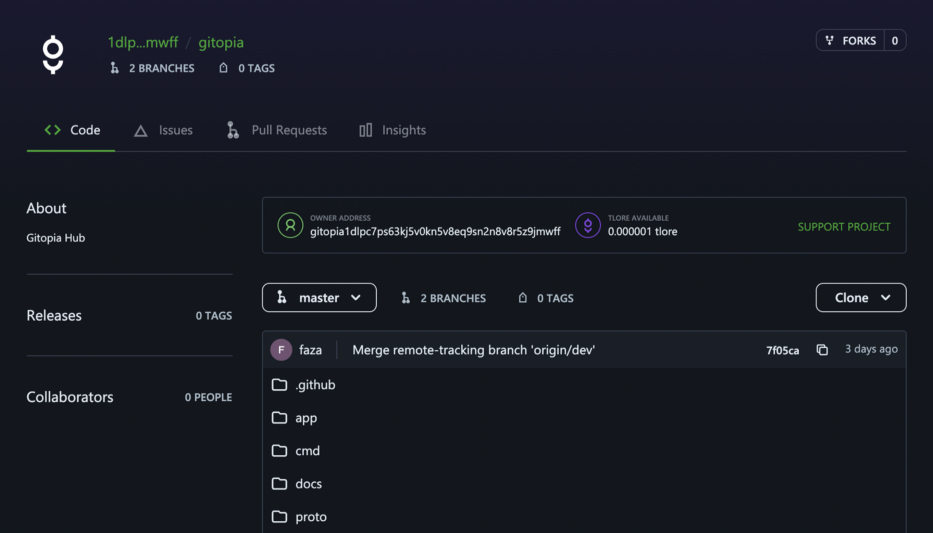
The primary purpose of a Code Collaboration Platform is to host your repositories and enable you to collaborate with other users on various projects. The first iteration of Gitopia’s Testnet allowed users to do the former easily but lacked various functionalities to do the latter effectively.
This testnet helps fix this problem by introducing various collaborative workflows like Issues, Forks, Pull requests, and Diffs. These features will enable developers to collaborate with their teams worldwide seamlessly.
Issues
Issues are a great way to keep track of tasks, enhancements, and bugs for your projects. They’re kind of like email — except they can be shared and discussed with the rest of your team. You can use Gitopia issues to plan work within teams and, for many other purposes, customize them to your needs and workflow. You can use Gitopia Issues to:
- Discuss the implementation of an idea.
- Track tasks and work status.
- Accept feature proposals, questions, support requests, or bug reports.
- Elaborate on code implementations.
Forks
A fork is a copy of a repository that you manage. Forking is a way of copying a project’s repository and using it as a basis for your own project. Forks on Gitopia will allow developers to experiment with changes without affecting the original project. You also can fetch updates from or submit changes to the original repository with pull requests.
Pull Requests
A pull request (often shortened to PR) is a mechanism for submitting changes to the source code of a software project. It allows developers to submit changes to the repository of another project, intending to review and possibly integrate those changes into the original project’s codebase.
Pull requests let you tell others about changes you’ve pushed to a branch in a repository on Gitopia. Once a pull request is opened, you can discuss and review the potential changes with collaborators and add follow-up commits before your changes are merged into the base branch. Pull Requests has its own section in every repository on Gitopia.
Diffs
Diff is the difference in changes between two commits or saved changes. Gitopia will let you optionally visualize code changes in a side-by-side or split view. This may help you grasp how code has evolved over time and can also help visualize your changes when working collaboratively.
When you use a pull request, you can see what will be changed in the repository by viewing the diff between the incoming request and the base repository.
Releases
One of the most important parts of the software development life cycle is delivering your software to those who use it. Introducing Releases, a workflow for shipping software to end-users.
Releases are packaged versions of your software, along with release notes and links to binary files that you can make available for a broader audience to download and use. You can think of it as a replacement for using downloads to provide software.
It is recommended to version or tag your releases with a changelog that reflects the breaking changes between releases. It gives you the ability to look back at a previous version of your software versus the latest release.
Introducing DAOs at Gitopia— A one-click solution to create actionable DAOs
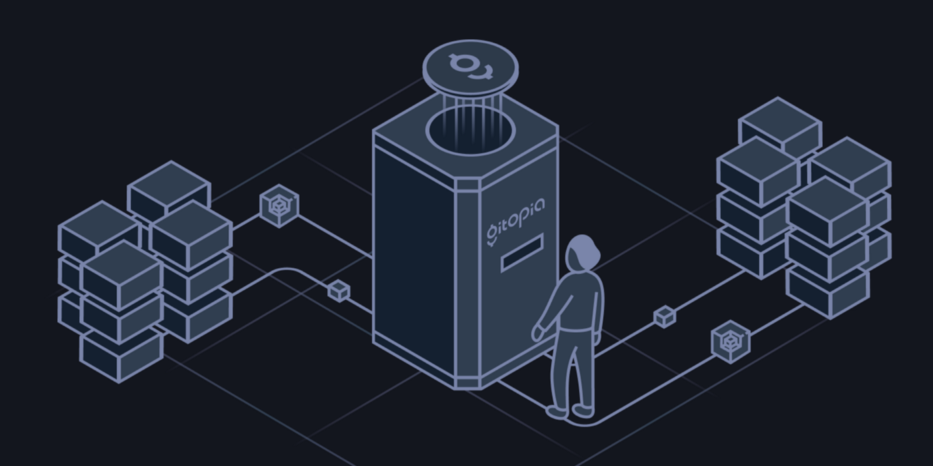
A DAO, or “Decentralized Autonomous Organization,” is a community-led entity with no central authority. It is fully autonomous and transparent: smart contracts lay the foundational rules, execute the agreed-upon decisions, and at any point, proposals, voting, and even the very code itself can be publicly audited.
Ultimately, a DAO is governed entirely by its individual members who collectively make critical decisions about the project’s future, such as technical upgrades.
The DAO model at Gitopia is a tool for communities to measure and reward value creation.
DAOs at Gitopia would provide a decentralized code management tool for people and institutions that do not know nor trust each other. It would rely on code instead of admins to allow developers to define the rules around codebases in a way that minimizes the need for trust. With DAOs at Gitopia, teams have access to an auditable and transparent history of repositories which are monitored by a programmed set of rules that is self-enforced by the majority consensus of all network actors and not a single admin.
A DAO opens up the floor to the wider community through proposals and request-for-comments. The purpose, resource requirements, key stakeholders, performance metrics, and actual results of an initiative are made transparent — creating accountability and a social layer of checks and balances. Decentralization doesn’t mean being leaderless. Instead, more people are empowered to take initiatives towards shared goals.
While many of the responsibilities of the DAO model at Gitopia overlap with those of traditional organizations, the core difference (and value proposition) is the opportunity to grow the ecosystem and develop meaningful relationships with contributors in the early era.
More details on the DAOs at Gitopia will be released shortly.
Meanwhile, you can create your DAO on Gitopia with one single step by following the docs
Gitopia adds Support for Ledger Hardware Wallet and Keplr Extention Wallet
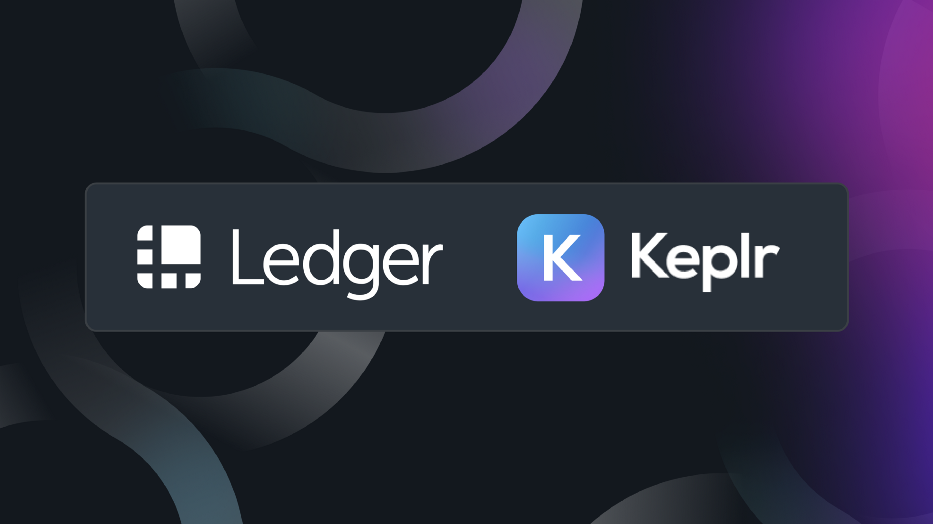
Gitopia users can now secure their Gitopia Wallet private keys using their Ledger Hardware Wallets. This means you can now have an additional layer of security for your assets when using Gitopia as your private keys now never even touch your computer.
The Ledger device acts as an enclave for your cryptocurrency private keys and other data — including the seed used to generate new addresses — and the process of signing a transaction takes place within it. No private information ever leaves the Ledger device.
Keplr is an open-source browser extension wallet that supports the Cosmos interchain ecosystem. It provides functionalities for account and wallet management for all Cosmos-SDK-based blockchains.
In Keplr, the private keys are stored locally. This removes the friction and risk of web pages having to manage user private keys safely and securely. As the user’s private key is not managed by the website, users do not have to worry about the level of security of the website. The user only has to trust the security guarantees of Keplr and freely interact with various web applications as they wish.
Check out the Gitopia documentation to learn how to use Ledger or Keplr Extension Wallet to interact with Gitopia.
Getting started with Gitopia
To enable you to dive in quickly, we advise starting with our documentation section. Just go to “Getting Started” and try it yourself!
Here are some resources to help you get started with Gitopia:
Why should you be an early adopter at Gitopia Janus Testnet?
Gitopia’s mission is to create a new paradigm for open-source software development and decentralized collaboration where everyone is a stakeholder, innovators are rewarded, contributors are motivated, and users have power.
With the cutting-edge code collaboration platform, Gitopia offers unique incentives for every participant’s contribution to the ecosystem. These incentives are appropriately aligned to motivate contributors and help drive up the innovation and growth of open-source software on the Gitopia platform while ensuring the smooth and efficient running of the ecosystem.
We will soon announce an incentivization mechanism on Janus Testnet for the community. The incentivization mechanism will hold rewards for Developers, Validators, DAOs, and Organizations to earn points which would later be converted to $LORE on genesis.
If you are a Validator or DAO and want to be part of the early stages of Gitopia and the Janus Testnet, talk to us by filling out these forms:
Validators: https://airtable.com/shrMQFJxcsMD0XV2M
Along with the incentivization mechanism, there would be suits of different activities for the community to participate in and earn points for the genesis rewards.
To know how developers, validators, DAOs, and organizations can benefit from using Gitopia, check out our previous blog — Demystifying Gitopia Ecosystem.
More information on how to earn LORE tokens and detailed information about the various activities planned will be released in subsequent blogs.
Stay tuned to know more!
- - -
Bug Reports
This is a beta release. Bugs can happen. Report the bugs by creating issues in the Gitopia repository. Please make sure to add appropriate labels like #bug, #enhancement, etc while posting. Create the issues by following the link: https://gitopia.com/gitopia/gitopia-web
Call for Feedback
We are always looking for feedback to improve Gitopia. Help us build the best possible product and tell us how you liked Gitopia & what we can improve:
Telegram: https://t.me/Gitopia
Discord: https://discord.com/invite/mVpQVW3vKE
Forum: https://forum.gitopia.com/
- - -
Follow us
Website: https://gitopia.com/
Whitepaper: https://gitopia.com/whitepaper.pdf
Telegram: https://t.me/Gitopia
Discord: https://discord.com/invite/mVpQVW3vKE
Twitter: https://twitter.com/gitopiaDAO
Forum: https://forum.gitopia.com/
